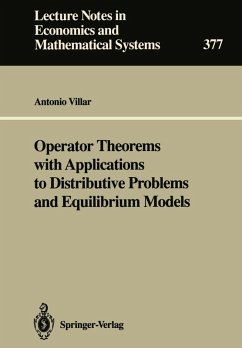Presentation Many economic problems, as equilibrium models, input-output analysis, rational behaviour, etc. , are usually modelled in terms of operators in Euclidean spaces. This monograph deals with the analysis of a number of formal problems involving this kind of operators (with particular reference to complementarity problems and variational inequalities), and their applications to distributive problems and equilibrium models. Thus the purpose of this work is to provide a set of new results on the solvability of those problems, and a number of economic applications that will illustrate the interest of these results in economics. It is worth stressing from the very begining that our analysis concentrates on the existence (and in some cases optimality) of solutions. That is what is meant here by solvability (in particular, nothing will be said with respect to the uniqueness, stability, sensitivity analysis or computation of solutions). The results on the solvability of operator problems presented here, were actually arrived at as a way of solving specific economic models. Yet we are going to relate this case by somehow reversing the way it happened, that is, starting with the formal results and then presenting a number of economic models which appear as applications of VIII these formal results. The rationale for this approach is twofold. First, it provides a neat track via which to go through the whole work. Then, because I would like to emphasize the interest of complementarity and variational inequalities problems in economic modelling.
Dieser Download kann aus rechtlichen Gründen nur mit Rechnungsadresse in A, B, BG, CY, CZ, D, DK, EW, E, FIN, F, GR, HR, H, IRL, I, LT, L, LR, M, NL, PL, P, R, S, SLO, SK ausgeliefert werden.


